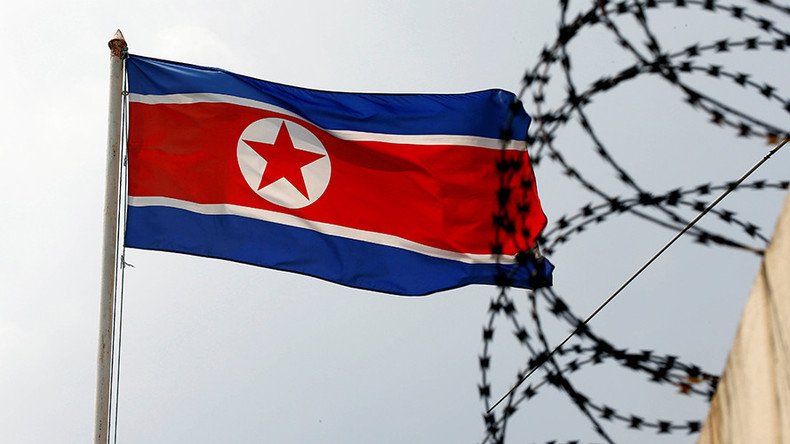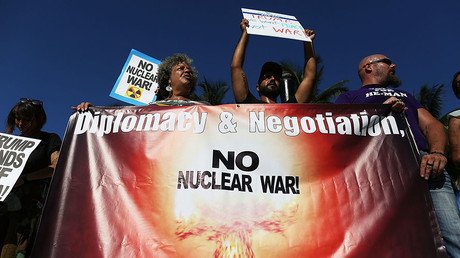‘US-Korean war games – catalyst for Pyongyang’s saber-rattling’

The planned US-South Korean joint military exercises might spark a reaction from Pyongyang which sees them as an indication Washington and Seoul want to invade North Korea and dissolve the regime, says former Pentagon official Michael Maloof.
North Korea called on Washington to take steps to calm tension on the Korean peninsula if it wants to avoid conflict. The country’s news agency claimed Kim Jong-un would “watch a little more the foolish and stupid conduct of the Yankees.”
It comes after South Korean President Moon Jae-in said there would be no military action without Seoul's consent, meaning a unilateral American intervention would not be supported.
Meanwhile, US President Donald Trump said North Korea made a "very wise and well-reasoned decision," in not striking the US island territory of Guam.
Kim Jong Un of North Korea made a very wise and well reasoned decision. The alternative would have been both catastrophic and unacceptable!
— Donald J. Trump (@realDonaldTrump) August 16, 2017
RT: To what extent does South Korea control what happens on the Korean peninsula? Does the US have more control?
Michael Maloof: The South may want to assert control, but ultimately the times have passed since the armistice was declared back in 1950. The reality is that North Korea wants to negotiate directly with the US. Plus they want to survive as a regime. The reality is that the US, as Secretary of State Tillerson pointed out, is willing to meet and talk if conditions are correct. This is where Russia and China would serve a very useful purpose in calling such a meeting, in which Tillerson, who said that we’re not after regime change or to destroy them, should offer at this point diplomatic relations. Just to challenge North Korea sincerity and wanting to do something. I think that would show a desire on the part of the US not to destroy North Korea…
N. Korea may put off Guam strike if ‘foolish Yankees’ refrain from provocations https://t.co/lssjkpDQj1
— RT (@RT_com) August 15, 2017
RT: North Korea's leader has tried to downplay the current tensions. What do you make of the fact that both Koreas are calling for de-escalation?
MM: I think that’s proper. There is going to be an impending South Korean – US military exercise, within the next week or so, if South Korea is sincere, maybe they should postpone as a signal to North Korea that they are sincere about de-escalating tensions on the peninsula. I have not heard that yet. What I am concerned about is if they proceed with those military exercises, that would be yet another catalyst for Kim Jong-un to start rattling the sabers again because he has almost reacted almost violently to previous military exercises. The reasoning is that this is the indication that the US and South Korea, in fact, want to invade North Korea and dissolve the regime.
RT: How would you assess China's role in the crisis? Can they help reduce the tension?
MM: Yes, China is caught between a rock and a hard place. They lost their leverage over North Korea after Kim Jong-il died, and when Kim Jong-un came to power, he literally killed his liaisons to China. That really upset the Chinese. It basically was to show that he was his person. Now, what China has been doing is trying to help the North Koreans with its economics, because if they were to stop everything entirely, including now – the implementation of these latest sanctions, if that has an effect of bringing down the regime – they’re going to have 25 million North Koreans streaming over the border into China. That would be humanitarian disaster. China is very aware of that. That is why China should, along with Russia, take that initiative of calling a meeting with the US and North Korea. North Korea and the US separately have said – they are willing to talk to one another. Well, let’s get it on.
‘Trump & Kim Jun-un very much alike in their rhetoric’
Lawrence Davidson, retired professor of history at West Chester University, says there is no policy coming out of the White House.
“There is only personality coming out of the White House. The president is not a strategic thinker. He is more of a school-yard bully. And that might, in fact, be what is coming out of North Korea as well. It seems to me that the two presidents are very much alike in terms of their rhetoric,” he told RT.
“Anybody caught in between or on the side finds this all very disturbing, and I don’t blame them. It took an awful long time for the national state system to be brought to stability through the development of the diplomacy. Now we’ve got a president who doesn’t know about that history – doesn’t care about it and only addresses himself to a constituency that like him is fogyish,” he said.
The state of affairs in North Korea though is not much different, which makes the situation “really dangerous”, according to Davidson.
“I think that is what we have in North Korea too. So it is a really dangerous situation. I don’t think that Trump or the President of North Korea are going to launch nuclear missiles, or anything like that on their own initiative... Small incidents can then very, very quickly develop into the kind of thing where each president is not trying to lose face,” he said.
The statements, views and opinions expressed in this column are solely those of the author and do not necessarily represent those of RT.













